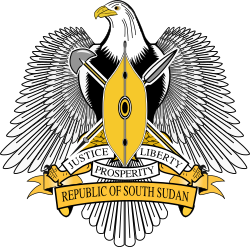Transitional National Legislature of South Sudan | |
|---|---|
 | |
| Type | |
| Type | |
| Houses | Transitional Council of States (upper house) Reconstituted Transitional National Legislative Assembly (lower house) |
| History | |
| Founded | 2011 |
| Preceded by | Southern Sudan Legislative Assembly |
| Leadership | |
Speaker of the Transitional Council of States | |
Speaker of the Reconstituted Transitional National Legislative Assembly | |
| Structure | |
| Seats | 650
|
 | |
Transitional Council of States political groups |
|
 | |
Reconstituted Transitional National Legislative Assembly political groups |
|
| Elections | |
| Coming soon: Indirect election | |
Coming soon:
| |
Last Reconstituted Transitional National Legislative Assembly election | 11–15 April 2010 (elections to the preceding Southern Sudan Legislative Assembly) |
Next Reconstituted Transitional National Legislative Assembly election | 22 December 2026 |
| Meeting place | |
| Ministries Complex Juba South Sudan | |
| Website | |
| http://nla.gov.ss/ | |
 |
|---|
| Constitution |
The Transitional National Legislature of South Sudan [1] is the legislative branch of the government of South Sudan. It consists of two chambers:
Contents
The National Legislature has its seat in Juba, South Sudan.